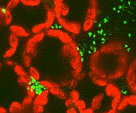Plant Pathology, Department of

Department of Plant Pathology: Faculty Publications
ORCID IDs
Document Type
Article
Date of this Version
2017
Citation
Published in Nature Microbiology 2 (2017), 17054. doi 10.1038/nmicrobiol.2017.54.
Abstract
Understanding how microorganisms manipulate plant innate immunity and colonize host cells is a major goal of plant pathology. Here, we report that the fungal nitrooxidative stress response suppresses host defenses to facilitate the growth and development of the important rice pathogen Magnaporthe oryzae in leaf cells. Nitronate monooxygenases encoded by NMO genes catalyze the oxidative denitrification of nitroalkanes. We show that the M. oryzae NMO2 gene is required for mitigating damaging lipid nitration under nitrooxidative stress conditions and, consequently, for using nitrate and nitrite as nitrogen sources. On plants, the Δnmo2 mutant strain penetrated host cuticles like wild type, but invasive hyphal growth in rice cells was restricted and elicited plant immune responses that included the formation of cellular deposits and a host reactive oxygen species burst. Development of the M. oryzae effector-secreting biotrophic interfacial complex (BIC) was misregulated in the Δnmo2 mutant. Inhibiting or quenching host reactive oxygen species suppressed rice innate immune responses and allowed the Δnmo2 mutant to grow and develop normally in infected cells. NMO2 is thus essential for mitigating nitrooxidative cellular damage and, in rice cells, maintaining redox balance to avoid triggering plant defenses that impact M. oryzae growth and BIC development.


Comments
Copyright © 2017 Macmillan Publishers Limited. Used by permission.